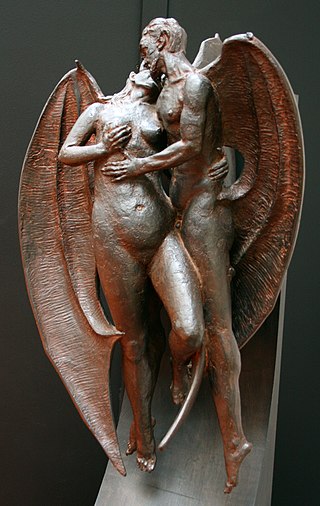Shaytan pl. Shayatin is a Hebrew and Arabic term referring to Satan or to satans.
The name Shaytan may refer to:
Shaytan pl. Shayatin is a Hebrew and Arabic term referring to Satan or to satans.
The name Shaytan may refer to:

A devil is the personification of evil as it is conceived in various cultures and religious traditions. It is seen as the objectification of a hostile and destructive force. Jeffrey Burton Russell states that the different conceptions of the devil can be summed up as 1) a principle of evil independent from God, 2) an aspect of God, 3) a created being turning evil, and 4) a symbol of human evil.

Iblis, alternatively known as Eblīs, is the leader of the devils in Islam. According to the Quran, Iblis was thrown out of heaven, after he refused to prostrate himself before Adam. Regarding the origin and nature of Iblis, there are two different viewpoints.

Satan, also known as the Devil, and sometimes also called Lucifer in Christianity, is an entity in Abrahamic religions that seduces humans into sin or falsehood. In Judaism, Satan is seen as an agent subservient to God, typically regarded as a metaphor for the yetzer hara, or "evil inclination". In Christianity and Islam, he is usually seen as a fallen angel or jinn who has rebelled against God, who nevertheless allows him temporary power over the fallen world and a host of demons. In the Quran, Shaitan, also known as Iblis, is an entity made of fire who was cast out of Heaven because he refused to bow before the newly created Adam and incites humans to sin by infecting their minds with waswās.
The Satanic Verses are words of "satanic suggestion" which the Islamic prophet Muhammad is alleged to have mistaken for divine revelation. The verses praise the three pagan Meccan goddesses: al-Lāt, al-'Uzzá, and Manāt and can be read in early prophetic biographies of Muhammad by al-Wāqidī, Ibn Sa'd and the tafsir of al-Tabarī. The first use of the expression in English is attributed to Sir William Muir in 1858.
Demonology is the study of demons within religious belief and myth. Depending on context, it can refer to studies within theology, religious doctrine, or occultism. In many faiths, it concerns the study of a hierarchy of demons. Demons may be nonhuman, separable souls, or discarnate spirits which have never inhabited a body. A sharp distinction is often drawn between these two classes, notably by the Melanesians, several African groups, and others. The Islamic jinn, for example, are not reducible to modified human souls. At the same time these classes are frequently conceived as producing identical results, e.g. diseases.

Michael, also called Saint Michael the Archangel, Archangel Michael and Saint Michael the Taxiarch is an archangel in Judaism, Christianity, Islam, and the Baha'i faith. The earliest surviving mentions of his name are in 3rd and 2nd-century BC Jewish works, often but not always apocalyptic, where he is the chief of the angels and archangels, and he is the guardian prince of Israel and is responsible for the care of Israel. Christianity adopted nearly all the Jewish traditions concerning him, and he is mentioned explicitly in Revelation 12:7–12, where he does battle with Satan, and in the Epistle of Jude, where the author denounces heretics by contrasting them with Michael.

In many Islamic and Islam-related traditions, Azazil is the legendary prototype of the devil in Islamic culture. Azazil was considered to be among the nearest to God's throne, but because he sinned through pride, he became a devil.
Shaidan may refer to:
Satan is an embodiment of antagonism, often synonymous with the Devil.
Marid is a type of powerful devil in Islamic traditions. The Arabic word meaning rebellious is applied to such supernatural beings.
A Qareen is a spiritual double of human, either part of the human himself or a complementary creature in a parallel dimension. Due to its ghostly nature, the Qareen is classified among the Jinn-type creatures, although usually not actually a Jinni. The Qareen as an accompanying spirit should not be confused with the Qarinah, a female "childbed demon" in Middle Eastern traditions.

Heavenly host refers to the army of angels mentioned both in the Hebrew and Christian Bibles, as well as other Abrahamic texts.

Adam is believed to have been the first human being on Earth and the first prophet of Islam. Adam's role as the father of the human race is looked upon by Muslims with reverence. Muslims also refer to his wife, Ḥawwāʾ, as the "mother of mankind". Muslims see Adam as the first Muslim, as the Quran states that all the Prophets preached the same faith of Islam.

In Christianity, the Devil is the personification of evil who rebelled against God in an attempt to become equal to God himself. He is depicted as a fallen angel, who was expelled from Heaven at the beginning of time, before God created the material world, and is in constant opposition to God. The devil is identified with several figures in the Bible including the serpent in the Garden of Eden, Lucifer, Satan, the tempter of the Gospels, Leviathan, and the dragon in the Book of Revelation.
Accuser may refer to:

"Pape Satàn, pape Satàn aleppe" is the opening line of Canto VII of Dante Alighieri's Inferno. The line, consisting of three words, is famous for the uncertainty of its meaning, and there have been many attempts to interpret it. Modern commentators on the Inferno view it as some kind of demonic invocation to Satan.

A shaytan is an evil spirit in Islam, inciting humans to sin by "whispering" in their hearts. Although invisible to humans, shayāṭīn are imagined to be ugly and grotesque creatures created from fire.

In the Hebrew Bible, the destroying angel, also known as mashḥit, is an entity sent out by YHWH on several occasions to kill the enemies of the Hebrews.

Little Satan is an anti-Zionist derogatory epithet used especially by Iranian leaders for Israel.
Shaitan is singular for a demon in Islamic belief. Alternative transliterations include Shaytan, Sheitan, Shaitaan, Shaytaan, Sheitaan and Shai'tan.